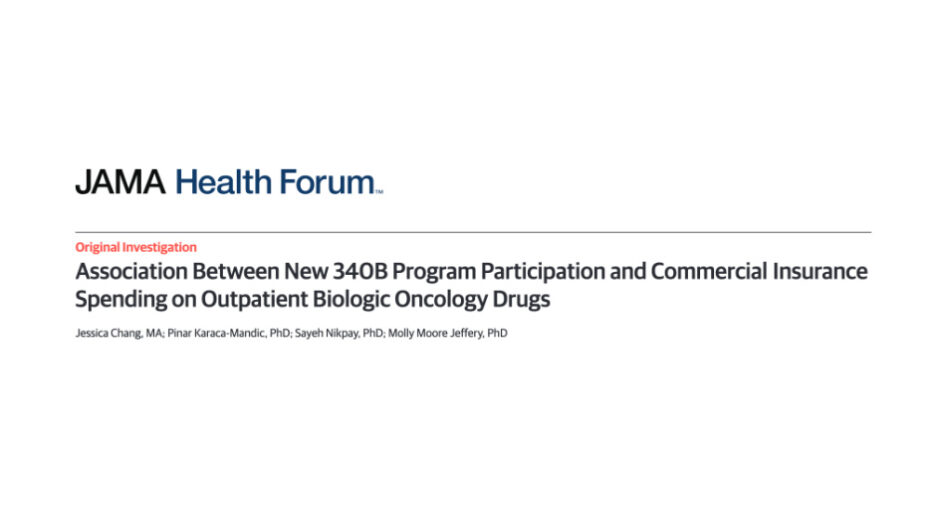Hospitals that enrolled in the 340B program after its expansion in 2010 treated more commercially insured cancer patients with five commonly prescribed biologic oncology drugs and spent more on the drugs, a new JAMA study found.
The authors of the June 23 study say their findings raise “questions over unintended consequences of the 340B program on drug spending from the commercially insured population.” Hospital groups strongly disagree. They said yesterday that higher use of and spending on cancer drugs reflects increased patient access to treatment, which is the stated goal of the 340B program. They also said that many hospitals that have joined 340B since 2010 are small rural hospitals that have expanded cancer care for rural patients.
The JAMA study analyzed episodes when patients with cancer were treated with the biopharmaceuticals bevacizumab (Avastin), filgrastim (Neupogen), pegfilgrastim (Neulasta), rituximab (Rituxan), and trastuzumab (Herceptin) at hospitals after the 2010 Affordable Care Act expanded 340B eligibility to new entities including rural hospitals and free-standing cancer hospitals. The study examined 478 hospitals during the timeframe of 2007–2019, divided among hospitals that entered the 340B program and a control cohort of hospitals that did not enter the program.
According to the analysis, total episode drug spending increased by an average of $4,074.69 in the year following the start of 340B program participation relative to nonparticipation. It found that both total drug spending and volume of episodes treated with these drugs increased following 340B program participation.
“When we stratified the analysis by patients with commercial insurance and patients with Medicare Advantage, we did not observe a differential increase in episode spending following 340B program participation among patients with Medicare Advantage,” the authors said. “However, we did observe a sharper and more pronounced differential increase in episode spending following 340B program participation among patients with commercial insurance.”
The new study adds to conflicting research findings on whether 340B hospitals buy and/or prescribe more expensive medicines than others. Prominent examples include:
- A June 2015 U.S. Government Accountability Office report that found that “per beneficiary Medicare Part B drug spending, including oncology drug spending, was substantially higher at 340B [disproportionate share] hospitals than at non-340B hospitals.” GAO said that “this indicates that, on average, beneficiaries at 340B DSH hospitals were either prescribed more drugs or more expensive drugs than beneficiaries at the other hospitals.”
- A February 2018 study published in the New England Journal of Medicine found that hospital eligibility for 340B was associated with “significantly higher” administration of Medicare Part B drugs in hematology–oncology and ophthalmology without clear evidence of expanded care or lower mortality among low-income patients.
- Hospital group 340B Health issued a study in 2018 that found that 340B DSH hospitals provide a higher level of care to low-income patients compared to non-340B hospitals and are more likely than non-340B hospitals to provide specialized services that are critical to vulnerable patients but are often underpaid.
- The Medicare Payment Advisory Commission reported in March 2020 that it found “no clear evidence of increased spending on cancer drugs attributable” to hospitals’ 340B status.
- A February 2022 study published in JAMA Network Open found “no statistically significant difference in Medicare Part B drug spending between 340B hospitals and non-340B hospitals.”
- A May 2023 study published in JAMA found “no evidence that 340B-eligible prescribers were systematically overprescribing brand-name drugs to generate revenue.”
Disagreement Over Study Conclusions
In the most recent JAMA study conclusion, the authors say “340B-participating hospitals may benefit from increased market power, which they use to negotiate higher reimbursements for drug episodes among commercially insured patients.” They close by hypothesizing that hospital systems may be expanding off-campus offices after they join the 340B program.
Bharath Krishnamurthy, director of policy at the American Hospital Association, criticized the study as being based on “preconceived notions of the 340B program” that can lead to illogical conclusions. “Their own data shows that 340B hospitals—after gaining access to the program—experienced increases in outpatient visits for cancer care, which means that more patients are getting access to vital cancer care services,” Krishnamurthy says. “The authors also fail to account for the relative sickness of cancer patients seen at 340B hospitals and the fact that through access to 340B discounted drugs, 340B hospitals are able to provide access to care for the sickest cancer patients.”
Carrie Cochran-McClain, chief policy officer at the National Rural Health Association, says the 340B program expansion under the ACA has allowed many rural hospitals to develop or enhance chemotherapy services, rather than requiring patients to travel long distances for cancer care. “With oncology services declining in many rural hospital settings, NRHA supports the 340B drug pricing program as a lifeline for continued access to critical oncological drugs,” she adds.
A spokesperson for the hospital group 340B Health declined to comment on the study. 340B Health has said in the past that 340B discounts “allow 340B hospitals to play a special role in the provision of cancer care for medically underserved patients.”


